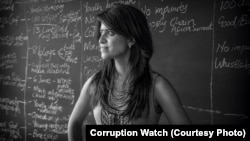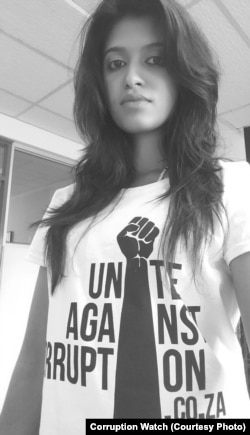Thousands of people pour into the Pretoria city center. They blow whistles and vuvuzela trumpets in a demonstration against the government.
In the middle of the mass is a slight, 23-year-old woman with long black hair. She wears white sneakers and a white T-shirt emblazoned with the words, "UNITE AGAINST CORRUPTION."
Kavisha Pillay’s self-proclaimed naiveté about graft was shattered about a year ago, when she began working for Corruption Watch. The NGO probes what she considers to be the “greatest blight” on modern-day South Africa.
Investigates corruption
Pillay, with a degree in journalism and communications, investigates corruption and manages the organization’s digital communications platform.
“So, in a nutshell, I’m trying to chase the bad guys and start an online revolution!” she exclaimed, laughing.
Pillay told VOA she's trying to build an “international online community of thousands of corruption fighters.” It’s a space where people share evidence of graft, and where the corrupt are named and shamed.
Corruption Watch recently helped expose 10 South African school principals caught pocketing money meant for their schools or falsifying students' grades in order to get increased funding from the government.
'Polluting' education system
Pillay said an upcoming report will show how individuals like this are “polluting” the nation’s education system and depriving children of their right to good quality learning.
“In most of these school corruption cases, it’s principals who are fingered. That makes sense because they are the ones responsible for school finances and governance. In some cases they blatantly steal money that should be used for textbooks and other educational equipment,” she said.
Pillay said in some cases, school principals are taking food from the mouths of hungry children.
The South African government allocates money for schools to feed hundreds of thousands of impoverished students across the nation. For many, the school meals provide their only regular nutrition.
But several principals "are using money that was meant for the feeding schemes for themselves and then providing food of a lesser quality [to their pupils] or no food at all," Pillay said.
“It’s a very sad situation when you see these kids that are going to schools where they could have huge opportunities and those opportunities are lost [because of] greed.”
'Taken note' of reports
South Africa’s Department of Education says it has “taken note” of Corruption Watch’s reports about corruption in the country’s schools. In the near future, it said, it will train principals nationwide in financial management and ethics in a bid to “root out” corruption in schools.
So far, one provincial education department — that of Gauteng province – has already established a “directorate for schools financial management and governance.” It has partnered with the South African Institute of Chartered Accountants to provide principals with “good governance skills.”
‘Culture of corruption’
Pillay claims graft is “infecting” all sectors in South Africa.
“We’re living in a very sick society. In some cases teachers are exchanging sexual favors [from pupils] for marks," she said. "If you are exposed to corruption at such a young age, when you grow up and when you develop you’re going to think that it is normal and then this culture perpetuates."
Like many in South Africa, Pillay blames President Jacob Zuma for helping to create a “culture of corruption.”
“South Africa sometimes seems like [a] broken home with Zuma being that father who left,” she said.
Zuma leads the ruling African National Congress, or ANC, party. Scandals involving alleged corruption have plagued his presidency since he took power in 2009.
In the most publicized scandal, the government used almost $20 million of taxpayer money to renovate Zuma’s private estate in KwaZulu-Natal province.
Following a public outcry, South Africa’s public protector investigated the issue and ordered him to pay back a significant part of this amount.
Zuma refuses, insisting that several state-led investigations into his conduct have cleared him of corruption in this case, as well as others.
Tide turning against graft?
Pillay's activities don’t endear her to the ANC, especially those close to Zuma. For them, her Sanskrit first name, Kavisha, doesn’t mean "poetry."
“One of our board members is a very senior ANC member as well and he was told by another ANC high-up that Corruption Watch should really be mindful about the people they hire and it shouldn’t employ people like me,” she said.
Pillay isn’t shaken, saying she hopes her critics realize that she’s just trying to make her homeland a better place… And that maybe she retains some of the “innocence” that characterized her life before she became a corruption buster.
“Maybe because of my age I’m still naive and I feel like I can change the world but I don’t think I was put on this earth just to consume oxygen," she said. "I think I have a greater purpose… Why not do something that is not in your own self-interest but benefits the rest of society?”
“The 10,000 people that have reported corruption to us [are] 10,000 heroes…," she continued. "People are actually now willing to do something about [corruption]. We see it with our whistleblowers that come forward. They are such passionate people; they want to see a change.”







